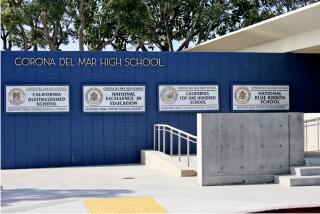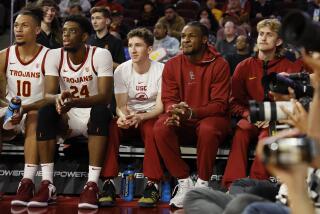CS Long Beach Receiver Mark Seay Cleared to Play by School : Football: He wins legal battle after he risked his life protecting 2-year-old niece from gunfire.
- Share via
Mark Seay, the Cal State Long Beach wide receiver who became a hero in a shooting that cost him a kidney, can resume his football career because it has been determined that his other kidney is working properly.
“It’s been a long hard struggle,” Seay said at a news conference Wednesday, his 23rd birthday.
He said he has kept in shape and is looking forward to Tuesday, when the 49ers begin their first spring practice under Coach George Allen.
“I think it’s great news; I’ve fallen in love with that guy,” Allen said.
Seay’s attorney, Richard J. Foster, said the university has agreed to a waiver that Seay will sign, absolving it of liability if the player should suffer an injury to his remaining kidney.
Seay, who had sued Cal State Long Beach last summer in an effort to keep playing, had resolved his legal differences with the university a month ago when, under an out-of-court settlement, the university agreed to allow him to play again if he was cleared in medical tests.
Foster said he was told Tuesday of the results of the tests, which were conducted two weeks ago by a Los Angeles kidney specialist and another Division I university team physician.
“They determined there’s absolutely no reason why Mark can’t play,” said Foster, who, at the request of the doctors, would not reveal their names.
He said the tests showed that Seay’s creatinine clearance--a measure of kidney function--was 82 cubic centimeters per minute, up from 71 last summer, when one kidney specialist said Seay should be allowed to play and another said he should not play.
During his sophomore season in 1988, Seay lost his right kidney after he was shot by a suspected gang member at a children’s Halloween party. He became a hero for shielding his 2-year-old niece from the gunfire.
Last summer, he was told by the university that he couldn’t play football because the risk of injuring his remaining kidney was too great.
Seay sued the school, maintaining that it should be his decision whether he should play.
But in September, U.S. District Judge Ronald S.W. Lew denied Seay’s request for an injunction ordering the school to let him play for the 49ers last season.
The judge said there was not clear proof that Seay’s remaining kidney was functioning properly. A jury trial had been scheduled for last month.
Deputy Atty. Gen. Christopher C. Foley, who represented the university, said he believed it would have been unlikely that the university could win in a trial.
Said a pleased Athletic Director Corey Johnson: “It was difficult to deny him his dream.”
More to Read
Go beyond the scoreboard
Get the latest on L.A.'s teams in the daily Sports Report newsletter.
You may occasionally receive promotional content from the Los Angeles Times.










